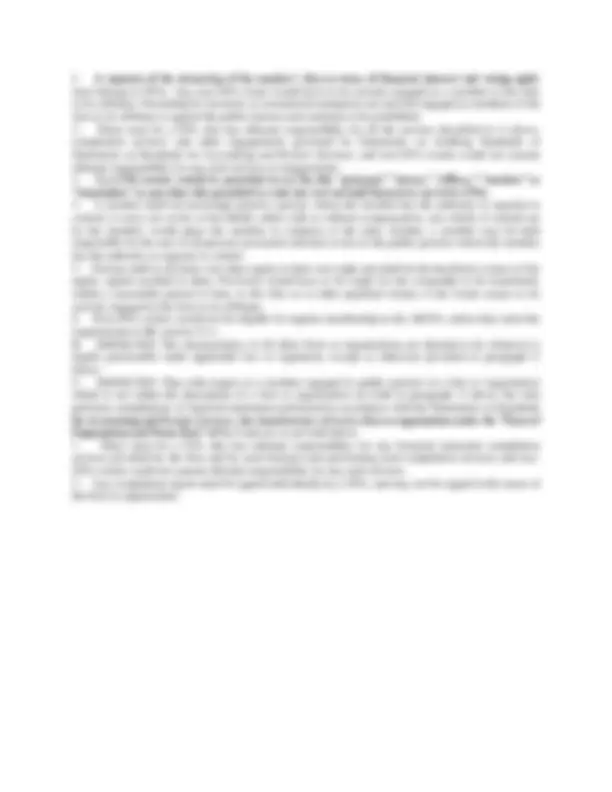



Study with the several resources on Docsity

Earn points by helping other students or get them with a premium plan


Prepare for your exams
Study with the several resources on Docsity

Earn points to download
Earn points by helping other students or get them with a premium plan
Community
Ask the community for help and clear up your study doubts
Discover the best universities in your country according to Docsity users
Free resources
Download our free guides on studying techniques, anxiety management strategies, and thesis advice from Docsity tutors
The council resolution approved on october 19, 2014, which amends the aicpa code of professional conduct's form of organization and name rule. The resolution requires aicpa members who perform attest services or use the designation 'cpa' in their firm's name to meet specific ownership requirements. The resolution also updates the list of attest services to include engagements performed in accordance with pcaob and ssae standards.
Typology: Lecture notes
1 / 2

This page cannot be seen from the preview
Don't miss anything!


Council voted on October 19, 2014 to approve changes to the "Council Resolution Concerning the Form of Organization and Name Rule" Set out in Appendix B to the AICPA Code of Professional Conduct.
The Council resolution, as amended, requires that AICPA members who are in firms that perform attest services or that use the designation "CPA" or "certified public accountant(s)" in the firm's name may only do so if the firm has certain characteristics, such as that a majority of the firm's ownership must belong to CPAs.
The approval given at Council on Sunday revises the list of attest services in Appendix B of the AICPA code to match the Uniform Accountancy Act (UAA) by including:
---Any engagement to be performed in accordance with PCAOB standards. ---Any examination, review, or agreed-upon procedures engagement to be performed in accordance with the Statements on Standards for Attestation Engagements (SSAE).
With the change, the AICPA Council demonstrated support for the UAA definition of attest and held AICPA members who perform SSAE engagements to the same CPA ownership requirements that the AICPA is encouraging the states to incorporate into their state accountancy laws.
Under the change, any firm that performs any examination, review, or agreed-upon procedures engagement under the SSAEs will be held to the same stringent requirements as, for example, firms performing review engagements under the Statements on Standards for Accounting and Review Services.
Adding the PCAOB engagements to the list creates consistency with a UAA definition that has existed since 2005 that included in the definition of attest any engagement performed in accordance with PCAOB standards. The text of the resolution is set out below. [Note: New language is underlined and text to be deleted is stricken.]
[As adopted May 23, 1994; revised May 7, 1997, May 15, 2000, May 22, 2006 and August 2011, and October 19, 2014.]
A. RESOLVED: That with respect to a member engaged in public practice in a firm or organization which performs (1) any audit or other engagement performed in accordance with the Statements on Auditing Standards, (2) any review of a financial statement performed in accordance with the Statements on Standards for Accounting and Review Services, or (3) any examination of prospective financial information performed in accordance with the Statements on Standards for Attestation Engagements, (4) any engagement to be performed in accordance with the standards of the Public Company Accounting Oversight Board (PCAOB), or (5) any examination, review, or agreed upon procedures engagement to be performed in accordance with the SSAE, other than an examination described in subsection (A) (3), or which holds itself out as a firm of certified public accountants or uses the term “certified public accountant(s)” or the designation “CPA” in connection with its name, the characteristics of such a firm or organization under the “Form of Organization and Name Rule” (AICPA, Professional Standards, ET sec. 1.800.001) of the Code of Professional Conduct are as set forth below: